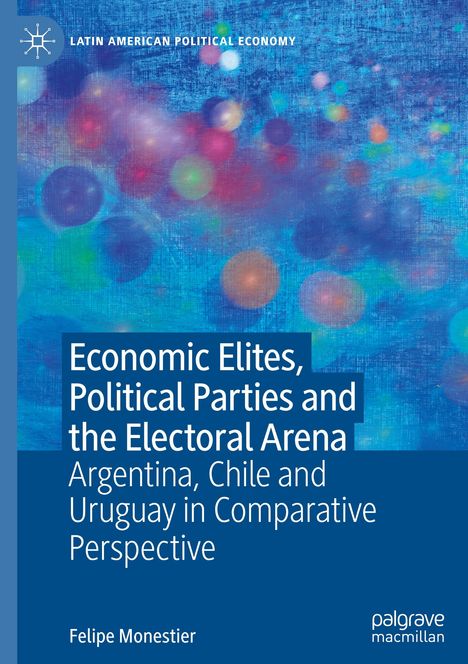Felipe Monestier: Economic Elites, Political Parties and the Electoral Arena, Gebunden
Economic Elites, Political Parties and the Electoral Arena
Buch
- Argentina, Chile and Uruguay in Comparative Perspective
- Verlag:
- Springer Nature Switzerland, 12/2023
- Einband:
- Gebunden, HC runder Rücken kaschiert
- Sprache:
- Englisch
- ISBN-13:
- 9783031461644
- Artikelnummer:
- 11714256
- Umfang:
- 212 Seiten
- Nummer der Auflage:
- 23001
- Ausgabe:
- 1st edition 2023
- Gewicht:
- 393 g
- Maße:
- 216 x 153 mm
- Stärke:
- 17 mm
- Erscheinungstermin:
- 15.12.2023
- Hinweis
-
Achtung: Artikel ist nicht in deutscher Sprache!
Weitere Ausgaben von Economic Elites, Political Parties and the Electoral Arena |
Preis |
|---|---|
| Buch, Kartoniert / Broschiert, Englisch | EUR 147,93* |
Klappentext
This book delves into the intricate dynamics between economic elites and the political party system in Argentina, Chile, and Uruguay, particularly during their democratization phases in the twentieth century. It introduces a novel framework for comprehending the diverse political strategies adopted by these countries economic elites during this critical period. The central premise of this book is that the interplay between the cohesion of economic elites and the mobilization of popular sectors at specific historical junctures profoundly influences the nature of elite political involvement. While existing literature has extensively discussed the strategies employed by economic elites to safeguard their interests, this book takes a fresh approach by considering three primary configurations of relationships between economic elites and political parties. It explores cases where economic elites are the primary constituency of parties they have founded, as well as instances where upper-class interests are predominantly defended outside the party system through mechanisms such as the armed forces, pressure groups, and lobbying. Additionally, it examines scenarios where economic elites align themselves with parties boasting a polyclass constituency, exerting limited influence over these parties.This book goes beyond traditional analyses by proposing a theory that elucidates how the interaction between elite cohesion and popular sector mobilization determines the specific forms of elite political involvement. It also charts the historical sequences of this process, emphasizing the evolution of the causal relationship over time. To illustrate this theory, the book employs a comparative historical analysis, scrutinizing the three aforementioned cases to identify factors that account for the different forms of economic elite political participation. It discerns that the level of cohesion among economic elites and the degree of mobilization among popular sectorsare pivotal factors shaping elite-party relationships.

